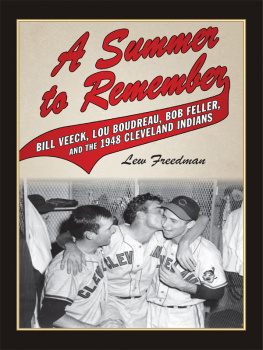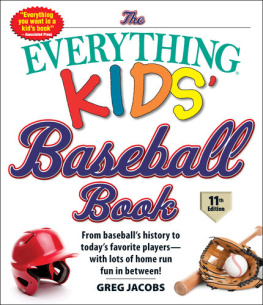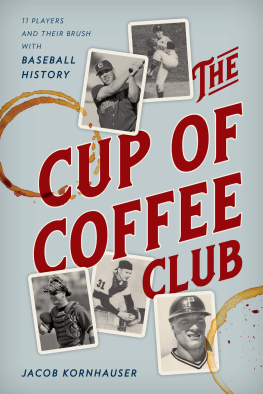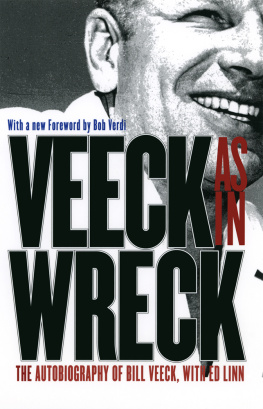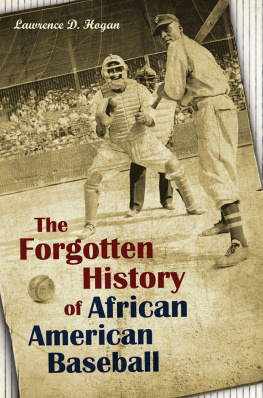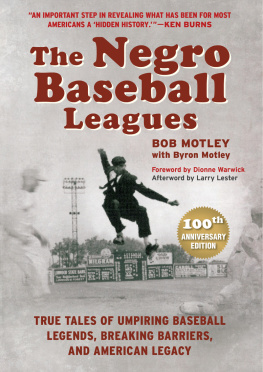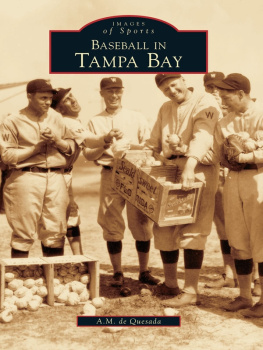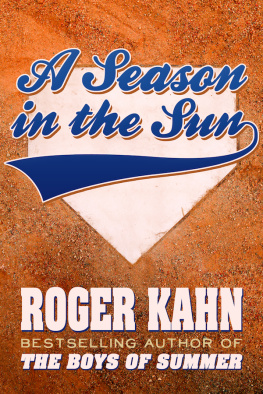The End of Baseball

The End of
Baseball
A NOVEL

Peter Schilling Jr.

THE END OF BASEBALL. Copyright 2008 by Peter Schilling Jr. All rights reserved, including the right to reproduce this book or portions thereof in any form. For information, address: Ivan R. Dee, Publisher, 1332 North Halsted Street, Chicago 60642, a member of the Rowman & Littlefield Publishing Grop. Manufactured in the United States of America and printed on acid-free paper.
www.ivanrdee.com
The paperback edition of this book carries the ISBN 978-1-56663-848-7.
Library of Congress Cataloging-in-Publication Data:
Schilling, Peter, 1968
The end of baseball : a novel / Peter Schilling Jr.
p. cm.
ISBN-13: 978-1-56663-782-4 (cloth : alk. paper)
ISBN-10: 1-56663-782-1 (cloth : alk. paper)
1. Veeck, BillFiction. 2. Baseball team ownersUnited StatesFiction. 3. Philadelphia Athletics (Baseball team)Fiction. 4. Baseball stories. I. Title.
PS3619.C37E63 2008
813'.6dc22
2007045781
For Janice
not because I think I should, but because I want to
(with apologies to Bill and Mary Frances)
Contents
The End of Baseball
Deep in the Heart of Texas

Its around here somewhere, Bill Veeck said. He was driving, his arm leaning out the open window with his sport shirt wide open, happy for the sunlight and dry air. When Josh swings that lumber, he said, again to no one, for he knew that his friend Sam Dailey had stopped listening long ago, youre going to see some fireworks. The greatest ballplayer in history, Negro or otherwise. Though he was behind the wheel, Veeck wasnt paying attention to the silver mirages shellacking the road, the heat undulating on the horizon, the sun-scorched countryside, or the abandoned farmhouse with a V for Victory sign on its cracked front window. It was late November 1943, and he was trying to see into the near future, trying his damnedest to imagine the coming storm and reassure his friend that it wouldnt blow their house down. Look, Sam, after they hit the diamond, after all those Josh Gibson home runs, and after we steamroll our way to the pennant, no one will care that theyre Negroes. Its all baseball, Sam. Thats whatll count.
The car hit a pothole and Veeck grimaced. He wore an artificial leg just below the right knee and was doing his best to ignore the pain, a difficult task as the apple-green Packards shot springs and the lousy roads meant every rut sent shock waves from his soles to his molars. A man of tics, about every five minutes he would shake a cigarette from the pack and light it against the one in his mouth. A case of warm beer rattled on the front seat between the two men, and Veeck would methodically slurp from a bottle, then stick a cigarette in his mouth, inhale with all his might, and bellow out smoke in great blasts. A smile brightened his face, a grin as wide as the open collars he wore in defiance against a world of ties. Still sporting his Marine-issue buzz cut, which brought out the blond in his thinning red hair, Veeck had the look of a blue-collar man: a face weathered from constant sun, aging him beyond his thirty years, and a voice scratched from having to shout over the clatter of the El trains of his hometown Chicago. Bill Veeck Jr. was the youngest man ever to own a major league baseball team.
The Packard roared over hills, drifted dangerously over the loose gravel, killing rattlesnakes sunning themselves on the road, and coiling dust in its wake.
Slow down, Sam begged, grasping the door. He was pale as lard, his stomach burning from indigestion, and looked like he was steaming in his suit and tie. As they raced through the Texas countryside, Sam tried to keep his nausea at bay, gulping air. God, Bill, theyll love us in St. Louis, he croaked sarcastically. You think people will want to see a ball game with the National Guard hanging around?
National Guard?
Yes, National Guard. You dont think people are going get a bit angry about this whole thing? People fight at ball games over a blown call. Were going to need police, firemen, probably the Guard to keep order. At first I thought, okay, this is another circus act. Fun and games. And here I am, going along with this, this... I dont even know what you call it, driving all over hells half-acre to look for phantoms. Sams stomach turned, and he gasped again, but held his hand up to tell Veeck to keep his mouth shut. After a moment, he continued. Let me ask you this: Do you really think the fans can handle Negroes playing ball with whites? On the same field? Oh, not just in Philadelphia. In St. Louis. New York, DetroitBill, Negroes burned down half the city this year! And we dont know the character of these players. Its not the drinking or the womanizing that bothers me, Sam said, though both bothered him a great deal. What if theyre violent? What if theyre gamblers? Landis wont tolerate Negroes, but hell wreck everything if theres gambling. Sam stopped. From the corner of his eye he could see Bill had quit listening and was looking a bit pained himself. Good, Sam thought. I cant be the only one living in reality. Integration, he added, hoping his last jab would hit Bill where it hurt. I just hope you know that this great experiment of yours doesnt set integrationin baseball and everywhere elseback a few years. With those last words dangling between them, they both stared out into the middle distance.
It had started with that phone call in late September. Around two in the morning, and Sam figured his father was finally dead. But the noise coming out of the receiver told him right off it was Bill. There were no introductions, no Im back from the war!, nothing about the injury, the lost leg, no How are you? or Hows business? Through the jumble Sam heard, Philadelphia Athletics! He heard the price, heard the job offer, and then heard the click. Within two weeks he and Bill Veeck owned the American League franchise known on paper as the Professional Base Ball Club of Philadelphia.
Back in the day they called Sam Dailey a Cornell man, though youd be hard pressed even then to find anyone who really knew what that meant. It could have referred to his habit of trying to maintain a look of serious commercial importance at all times: the days were few when Sam wasnt attired in a sharp jacket, crisp white shirt, conservative tie. Perhaps it referred to the crew cut he had trimmed once a week, or the black horn-rimmed glasses. The whole works framed by a squared jaw, topping a portly frame. Mostly, being a Cornell man meant that hed mention Cornell at least once a day.
Veeck had waited all his life for this opportunity. William Veeck Jr. had grown up in the dusty corridors of Wrigley Field, where his father, the stoic William Veeck Sr. had served as president of the Chicago Cubs in the 1920s and 1930s. The senior Veeck taught his son everything about baseball, and while young Bill eschewed the suits and ties of his father, he kept the lessons close to his heart. The elder Mr. Veeck was an innovator, a man who understood that you needed to build a winning team


